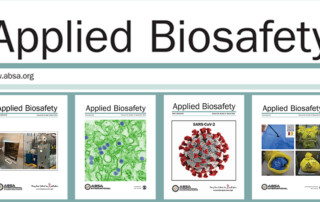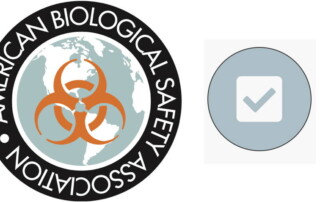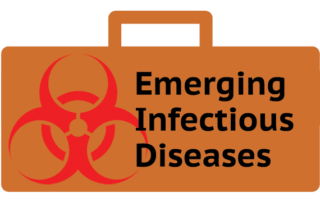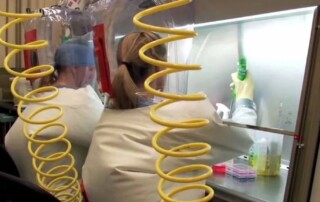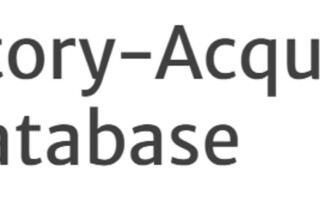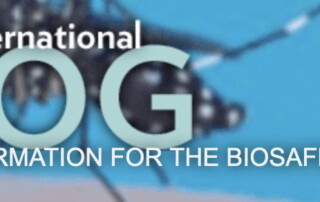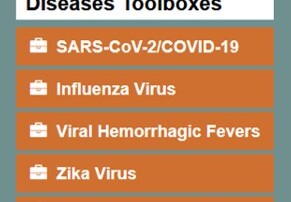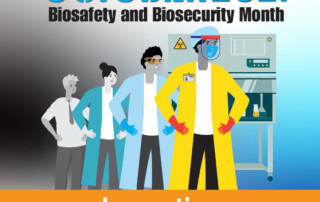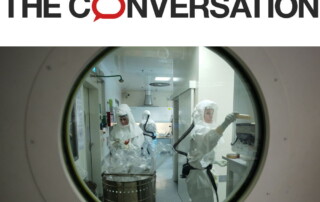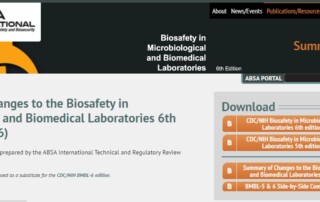Call for Nominees for 2024 ABSA International Election
The Nominating Committee has begun the process of identifying candidates for this year’s ABSA Council and Nominating Committee elections. Deadline: March 31, 2024 Open positions for 2024 include: President-Elect, Secretary, Councilor (2 positions), and Nominating Committee (4 positions). All people being nominated for a position must be current 2024 ABSA members.
Looking for Waterborne Diseases or Fungal Diseases resources to conduct your risk assessments?
The ABSA Emerging Infectious Diseases Committee (EIDC) collated resources that will help the biosafety professional conduct risk assessments for waterborne diseases and fungal diseases. The CDC says "every year, waterborne disease causes 7 million illnesses and $3 billion in healthcare costs in the US". The Waterborne Diseases toolbox (https://absa.org/topic/waterborne/) include resources for the US and abroad, includes publications, manuals for surveillance, applicable regulations, risk mitigation, and more. Human fungal diseases are increasing in importance globally and, unfortunately, the perception of their importance to public health is much lower than is required for an effective response. Fungal pathogens have not [...]
Biosecurity Commentary: Hacking a Lab’s Pathogen Containment System; should this experiment have been published?
A recent article by a group of cyber-physical security experts at University of California Irvine (UCI) highlighted a potential vulnerability in negative pressure containment rooms. https://dl.acm.org/doi/10.1145/3548606.3560643 A commentary about this article was authored by George Poste and David Gillum at Arizona State University asking the question: "Should this research have been published?" https://thebulletin.org/2023/01/researchers-hacked-a-labs-pathogen-containment-system-was-it-a-good-idea-to-publish-the-results/#post-heading The authors discuss the impact of publishing lab vulnerabilities considering recent scrutiny of potential gain-of-function research and the relative lack of government oversight over this line of research. They go on to criticize the disparity between this release of information and how the cybersecurity community has [...]
Updated ABSA LAI Database include ZIKV, Macacine alphaherpesvirus 1, SARS CoV-2, and Shiga Toxin
The ABSA International Laboratory-Acquired Infection (LAI) Database has posted new entries for the following pathogens or toxins. You can search partial terms using the asterisk (*), AND, OR: 2013- Shiga Toxin from Escherichia coli O157:H7: mixing six E. coli O157:H7 strains in a soil-biochar blend Unknown time- Zika Virus; Injection of a highly concentrated live ZIKV strain into a mouse, followed by blood withdrawal and sacrifice of the mouse 2021- SARS-CoV-2; Actual cause not identified. The article speculates that the researcher took off her PPE in the wrong order, starting with the "face mask." 2021- Monkey B virus, Herpes B virus, Macacine alphaherpesvirus [...]
Building Safety Bridges
It is easy for groups within institutions to fall victim to a “silo” operational approach, between handling day-to-day operations and unplanned challenges. The danger in this is obvious when safety is isolated as a group few know about and only turn to when there is an occupational exposure. Building bridges between safety professionals and other groups within an institution - be it veterinary support, maintenance or researchers - is important to ensure the safety of all employees and strengthen safety culture. Implementing communication programs to build internal outreach can take the form of periodic publications or regular working group meetings. [...]
Recent Updates to the EIDC Toolboxes January 2022
The ABSA International Emerging Infectious Diseases Committee (EIDC) continues to update the toolboxes for salient infectious diseases and other relevant topics such as antimicrobial resistance. The latest updates include the following: SARS-CoV-2/COVID-19 Toolbox updates feature resources related to minimizing transmission of SARS CoV-2 from free-range animals to humans, recent peer-reviewed publications on SARS CoV-2 variants, transition from pandemic to endemic status of SARS CoV-2 transmission, COVID-19-related syndromes, CDC updates regarding isolation and quarantine timing. Lastly, the EIDC's resource titled Considerations for Handling Potential SARS-CoV-2 samples was updated to reflect the recent Federal Select Agent and Toxins Interim Rule published in [...]
A Recap of Biosafety and Biosecurity Month
Thank you to everyone who participated in the 2021 Biosafety and Biosecurity Month in October. Putting a spotlight on Biosafety and Biosecurity at our institutions is an excellent way to foster a culture of biosafety and biosecurity. Did you know that Biosafety and Biosecurity Month began as a “National Biosafety Stewardship Month”, sponsored by the National Institutes of Health Office of Science Policy as an initiative to promote stewardship of the life sciences and biosafety awareness? In 2017, the torch was passed from the NIH OSP to ABSA Intl. to continue the spotlight month. We’ve celebrated four years of different [...]
Reporting all biosafety errors could improve labs worldwide – and increase public trust in biological research
David Gillum, Kathleen Vogel, Rebecca Moritz The origin of SARS-CoV-2 remains a mystery. One theory is that the coronavirus that causes COVID-19 was transmitted from animals to humans – a fairly common occurrence. Another is that it came from a laboratory accident – a more infrequent circumstance. Around the world, scientists conduct many kinds of biological research experiments – from basic studies exploring how living systems operate to synthesizing novel organisms. Applications range from developing medical treatments to protecting the food supply to modifying bacteria to cleaning up oil spills and much more. A subset of experiments may also involve [...]
Have you read the CDC/NIH BMBL-6 yet? The ABSA International Summary of Changes and the Side-by-Side Comparison will help focus your reading.
The ABSA International Technical and Regulatory Review Committee compiled a Summary of Changes and a Side-by-Side Comparison to the 6th edition of the CDC/NIH Biosafety in Microbiological and Biomedical Laboratories (BMBL-6) released in November of 2020. The BMBL-6 continues to be, since the first edition in 1984, an advisory document. Consequently, words such as "must" and "should" have been mostly removed. In our review, we found updates to every section of the BMBL, from title changes to added references to include publications since 2009, when the 5th edition of the BMBL was published. We noticed, for example, new references to Zika and Vibrio cholera [...]

